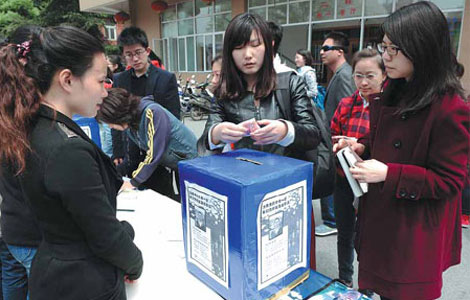China's efforts to prevent hearing loss gain WHO recognition
Updated: 2013-05-08 11:07
By Liu Zhihua (China Daily)
|
|||||||||||
 |
|
Free newborn screening is one of China's most effective efforts in preventing hearing loss. Gong Bo/For China Daily |
China has been doing well in controlling hearing loss, a World Health Organization official says.
A global conference of WHO Collaborating Centers for the Prevention and Rehabilitation of Hearing Impairment was held in Beijing in late April. It was aimed at enhancing the network and cooperation among the seven centers worldwide, and marked China's effort to reduce hearing loss prevalence and damage.
"If you talk about China, the government and its programs are certainly making a big difference," says Shelly Chadhas, medical officer for hearing impairment with WHO.
"The programs focus on children with deafness, but also address the need of growing children with hearing problems, and how to approach the elderly population."
Currently, more than 5 percent of the world's population - about 360 million - have hearing loss, and approximately one third of those over 65 have the problem.
South Asia, the Asia-Pacific region and Sub-Saharan Africa have the highest prevalence of hearing problems among elderly people, according to a 2013 WHO report.
In China, 27.8 million people suffer from hearing impairment, and it is estimated that 11 percent of people older than 60 have hearing impairment, that is to say, about 20 million elderly have moderate to severe hearing problem, according to Hu Xiangyang, director with China Rehabilitation and Research Center for Deaf Children, one of the seven WHO Collaborating Centers for the Prevention and Rehabilitation of Hearing Impairment.
"China has achieved great progress in hearing loss prevention and rehabilitation since the 1980s," Hu says.
"This is visible to people all over the world."
China offers free newborn screening, hearing aids, and cochlea implants for children younger than 6 from families with low income. Hearing loss can delay language acquisition and lead to social isolation, and 400,000 children have benefited from such programs, according to Hu.
For adults, especially people older than 60, free hearing aids are also available, though limited to about 10,000 a year.
Some big cities like Beijing provide free genetic screening and consulting for couples, as well as newborn screening.
Hu says toxic-related hearing loss was very common in China in the past, but with decades of public education and drug administration, such cases have become very rare.
In early 2013, WHO decided to extend China's national Ear Care Day (March 3) - which was initiated in 2000 by the Chinese government to raise public awareness on hearing health - to become International Ear Day.
"The conference our institute organizes and the extension of China's Ear Care Day to International Ear Day shows WHO's recognition of China's work in controlling hearing loss," Hu says.
But, the gap in addressing hearing loss among regions in China varies, and the aging population also produces more challenges, Hu says.
Chadhas, WHO's medical officer, says she hopes China will extend its activities in hearing-loss prevention and rehabilitation to countries with greater need of human resources and expertise.
|
|
|
Related Stories
Farmers busy with planting crops in SW China 2013-05-08 09:48
Preview of China Guardian 2013 Spring Auctions opens in Beijing 2013-05-08 09:38
China demands efforts against antibiotics overuse 2013-05-07 23:40
GM to build billion-dollar factory in China 2013-05-08 05:38
China opposes US report on Chinese military 2013-05-07 23:51
Today's Top News
Detention of petitioners denounced
Lawyers get an advocate
Pentagon accusation on China's military rejected
Foster homes for homeless children
Public hearing to discuss taxi fare increase
21 Party officials, SOE managers disciplined
Clarity on tax evasion needed, lawmakers told
Visa policy to attract global tourists
Hot Topics
Lunar probe , China growth forecasts, Emission rules get tougher, China seen through 'colored lens', International board,
Editor's Picks

|

|

|

|

|

|







